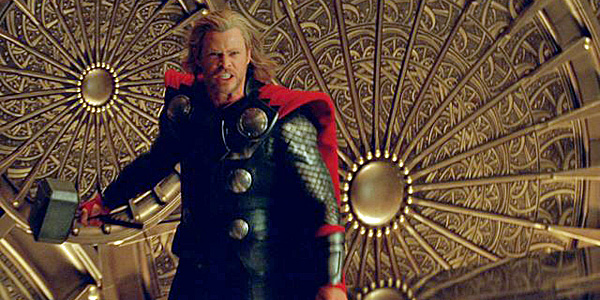'Thor': Preposterous but Never Quite Stupid (original) (raw)
A review of the Kenneth Branagh-directed superhero movie

Paramount Pictures
The first written reference to the Norse god Thor is believed to have been by the Roman historian Tacitus in De Origine et situ Germanorum in 98 A.D. The first written reference to the superhero Thor wouldn't occur until 18 and a half centuries later, in August 1962, in Marvel Comics' Journey Into Mystery #83. The latter began: "Our story opens on the windy coast of Norway, where we see a frail figure silhouetted against the bleak sky! He is Dr. Don Blake, an American vacationing in Europe! And, as Doctor Blake turns and leaves the site, he doesn't see the strange alien spaceship which silently lands behind him!" Such innocence! Such simplicity! Such exclamatory punctuation!!
The spaceship in question contains a gaggle of extraterrestrial invaders (the "Stone Men from Saturn") intent on enslaving humanity. Fleeing the craggy aliens, Blake hides in a cave, where he happens to find an old walking stick. When he accidentally bangs it against a rock, it ignites like an otherworldly match and—poof!—the stick transforms into a warhammer and the doctor into, well, he's initially not quite sure what. Long blond hair, rippling biceps: could he be Fabio? Such fears are quickly laid to rest when he reads the large block letters on the hammer's side: "Whosoever holds this hammer, if he be worthy, shall possess the power of ...Thor." (One can't help but wonder what Asgardian legalese might be hidden within that ellipsis.)
Thor arrives in multiplexes a mere half-century later but, in keeping with the temper of the times, the movie does away with Norway, the Saturnian Stone Men, and the frail Dr. Blake himself. Directed by Kenneth Branagh (from whom the producers clearly hoped for a little Shakespearian oomph), the film opens as a cosmic tornado eases down on the smooth sands of New Mexico. Observing the phenomenon are astrophysicist Jane Foster (Natalie Portman), her avuncular mentor (Stellan Skarsgard), and a halfhearted intern (Kat Dennings). In an effort to get closer to the action, the gang drive their van over a man standing dazedly at the epicenter of the storm. (Blond locks? Check. Biceps? Check.) "Where did he come from?" Jane exclaims.
Glad you asked. A substantial chunk of backstory establishes that this is indeed Thor (Chris Hemsworth), newly banished from celestial Asgard by his father Odin (Anthony Hopkins). Incited by his deceitful brother Loki (Tom Hiddleston), the headstrong Teutonic hunk had caused a political incident by launching an unauthorized incursion against the frost giants of Jotunheim. His resulting sentence comingles the Christian and Arthurian: Thor is sent to Earth to live life as a mortal, and his hammer, Mjolnir, is implanted in the Southwestern bedrock, from which it will only be pulled by one who is worthy—unlike, at the moment, Thor—of Thor-ness.
Following his abrupt introduction to the front bumper of Jane's van, the Asgardian and the astrophysicist quickly begin exchanging interested glances. The attraction continues even after a zealous midlevel agent of S.H.I.E.L.D. (Clark Gregg, reprising his role from the Iron Man films) confiscates Jane's research, and Thor tries, with limited success, to retrieve it.
Of all the Silver-Age Marvel heroes (Spider-Man, the Fantastic Four, etc.), Thor was perhaps the highest-concept and hardest to relate to. He was, after all, a god—even if he spent his downtime as the fragile Dr. Blake (a notion the comics, like the film, eventually abandoned). In Branagh's telling (from a script by Ashley Miller, Zack Stentz, and Don Payne), Thor and his fellow Asgardians are essentially extraterrestrials, long ago mistaken for gods by superstitious Scandinavians. Accordingly, the rainbow bridge between Asgard and Midgard (that's Earth to you and me) is reimagined as an interstellar wormhole machine—think Star Trek's transporter, but with Scotty replaced by mythical gatekeeper Heimdal. The whole aliens-mistaken-for-gods bit is also a way to add a little multiracial variety to the roster of Norse mythology: Heimdal is played by The Wire's Idris Elba; Hogun, one of Thor's warrior pals, by Japanese star Tadanobu Asano.
If all this sounds a bit like the last verse of Styx's "Come Sail Away"—well, it is. And it must be said that, however good a job one might do of costuming such god/alien figures—and I think a reasonably good job was done here—they're inevitably going to wind up looking pretty silly in their anachro-futurist armor. Perhaps the most off-key moment in the film is when Jane, who's seen the topographically buff Thor in jeans and (sometimes) a t-shirt, finally views him in full Asgardian regalia and declares, "It's a good look." Not even astrophysicists have such appalling fashion sense.
But for those willing to tolerate such aesthetic infractions, Thor, however preposterous, is never quite stupid—which, given the prevailing norms of contemporary action filmmaking, is a notable accomplishment. Hemsworth (an Australian import best know to American audiences for his role as Kirk's doomed dad in Star Trek) brings a dose of wit and charm to the lead role; Hiddleston underplays Loki nicely; and Portman, Skarsgard, Hopkins, and Dennings deliver their customary talents.
In keeping with the directive that All Roads Lead To The Avengers, the movie is sprinkled with cross-pollinations: a cameo by Hawkeye-to-be Jeremy Renner, a direct reference to Tony Stark, an indirect one to Bruce Banner. And there is, of course, the usual post-credit coda, featuring Samuel L. Jackson's Nick Fury. The film may not be on a par with the best Marvel has offered us over the past several years—the initial Spider-Man and Iron Man, the first two X-Men. But for those with a taste for the genre, Thor is a worthy addition to the pantheon.
